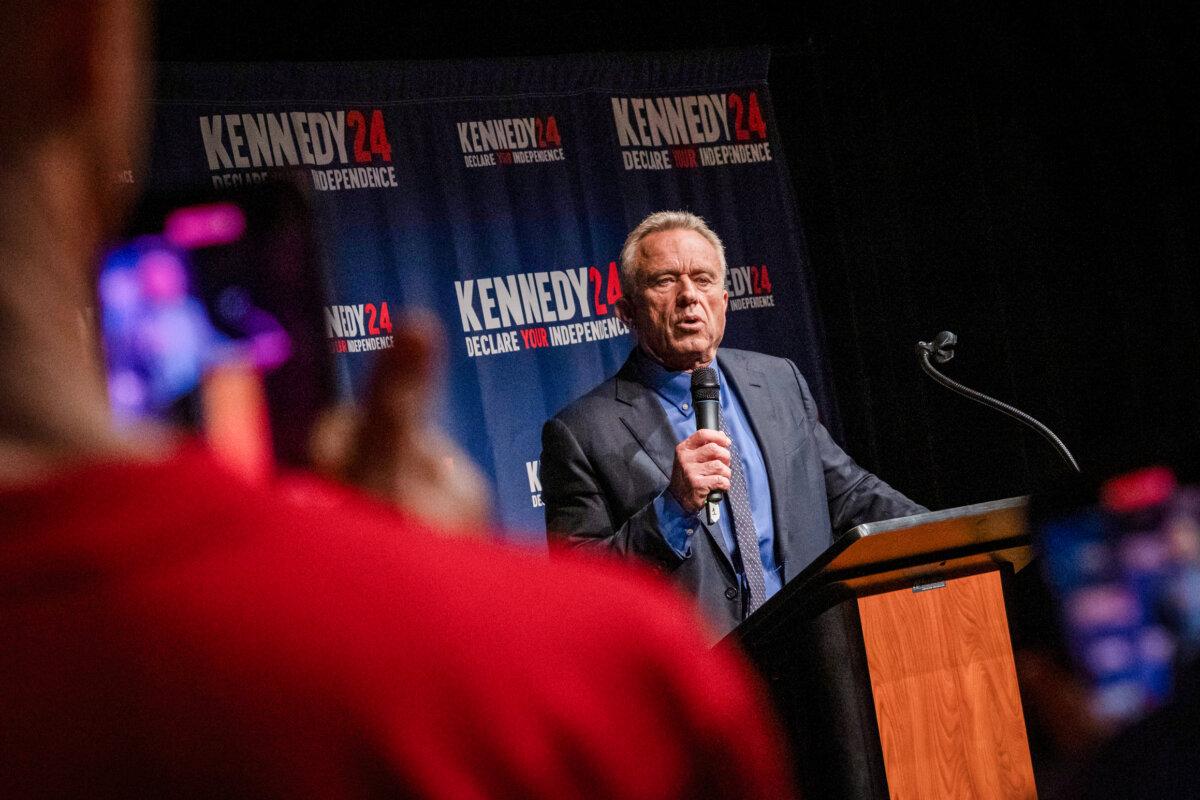Utah Lt. Gov. Deidre Henderson announced that Robert F. Kennedy Jr. would have until March 5, 2024, to submit 1,000 signatures from qualified voters.
The Epoch Times – Jeff Louderback
Robert F. Kennedy Jr.’s quest to qualify for the ballots of all 50 states and the District of Columbia received a boost on Dec. 7 when Utah Lt. Gov. Deidre Henderson announced she would extend the deadline for independent presidential candidates to gain ballot access to March 5, 2024.
Mr. Kennedy filed a lawsuit against Utah officials on Dec. 4 citing an “unconstitutional early filing deadline” that prevents ballot access for independent presidential candidates.
The legal action challenged Utah’s Jan. 8 deadline requiring independent presidential candidates to collect and verify 1,000 signatures from qualified voters.
Mr. Kennedy’s lawsuit argued that “the current deadline is the earliest deadline ever sought to be imposed on independent presidential candidates in the modern era. No federal court has ever upheld a January deadline [for independent presidential candidates].”
Ms. Henderson and Ryan Cowley, director of elections for the State of Utah, were named as defendants.
Paul Rossi, who is part of the legal team for Mr. Kennedy’s campaign, said after the lawsuit was filed that the early filing deadline “directly impairs voters from casting meaningful votes in the general election” and the law “is clearly designed to prohibit and impair independent candidates from appearing on Utah’s general election ballot next year.”
In the Dec. 7 court filing, attorneys for Ms. Henderson said the lieutenant governor would give Mr. Kennedy “an additional 60 days” to file the certificate and “other necessary papers or for the parties to litigate or otherwise resolve the present dispute.”
“Defendants agree and represent to the court that, until at least March 5, 2024, they will not reject any unaffiliated candidate’s certificate of nomination to be placed on the ballot in Utah for the office of president of the United States, simply because the certificate and verified nomination petitions were not filed by Jan. 8, 2024,” the court filing noted.
Mr. Kennedy praised the decision.
“In a democracy, the people are supposed to decide with their votes who gets into office. Not state officials who prevent popular candidates from getting on the ballot,” he said.
Mr. Rossi said in a statement, “I am pleased Lt. Gov. Henderson had the courage to correct the wrong committed by the state Legislature in their intentional assault on the constitutional right of Utah voters to cast their vote for Mr. Kennedy in 2024.”
The lawsuit will continue to advance through the courts, even with the decision to extend the deadline. In the same court filing, Ms. Henderson proposed that a hearing take place the week of Jan. 15, 2024.
“This decision has been made in the spirit of affording every reasonable opportunity for unaffiliated presidential candidates to participate in our general election. Key legislators are aware of the potential problems with the current statute. I am confident these issues will be addressed in the upcoming legislative session,” Ms. Henderson said in a statement.

Mr. Kennedy announced he would no longer run as a Democrat and instead switch to independent candidate status on Oct. 9.
Guidelines for securing a ballot spot differ in many states, as do deadlines. Legal challenges from Democrats and Republicans intent on keeping Mr. Kennedy off the ballot are possible. There are processes to challenge signatures after they’ve been submitted to election offices in multiple states.
Some states have varying guidelines about the number of signees in different parts of their state.
Stefanie Spear, the press secretary for Mr. Kennedy’s campaign, said that the signature collection effort is underway “in many of the open states.”
“We have a robust ballot access and legal team and Kennedy’s name will be on the ballot in all 50 states,” Ms. Spear added.
A 1980 U.S. Supreme Court ruling established a precedent for Mr. Kennedy’s lawsuit, Mr. Rossi explained.
“John Anderson was an independent candidate against Ronald Reagan and Jimmy Carter, and he announced his candidacy after March that year. And because Ohio’s March 15 deadline was so early, he was prevented from making the ballot,” Mr. Rossi said.
Voters and candidates need time to assess the major party candidates to determine if they would support a third-party candidate, according to the court ruling.
“Back in 1984, Utah had an April 15 deadline and the secretary, the lieutenant governor’s office at that time, recognized that that deadline was so early and unconstitutional that they told independent candidates, ‘Don’t worry about it, we’re not enforcing it,'” Mr. Rossi said.
Earlier this week, American Values 2024, a super PAC supporting the election of Mr. Kennedy, announced plans to spend as much as $15 million to get Mr. Kennedy on the ballot in 10 states deemed important to winning the election.
The organization intends to spend money to collect signatures by hand, as state law requires, in Arizona, California, Colorado, Georgia, Illinois, Indiana, Michigan, Nevada, New York, and Texas.
“We have chosen to pursue these critical states, some of them battlegrounds, due to the complexity of the state election codes and the volume of signatures necessary to achieve ballot access.” Deirdre Goldfarb, an adviser to American Values 2024, said in a press release.
Signatures from the 10 states represent about half of what is required to secure a spot for Mr. Kennedy on ballots nationwide.